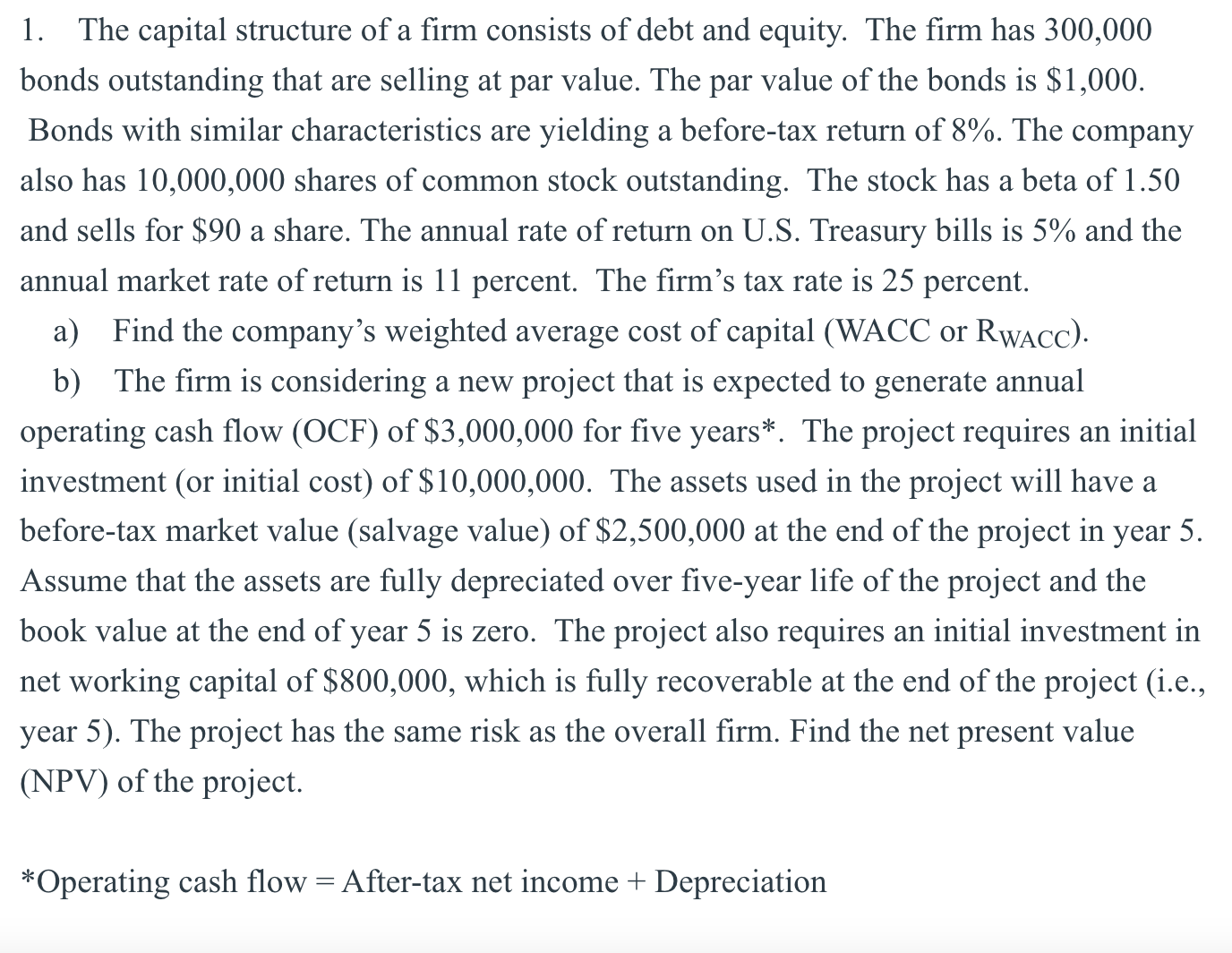Answered step by step
Verified Expert Solution
Question
1 Approved Answer
1. The capital structure of a firm consists of debt and equity. The firm has 300,000 bonds outstanding that are selling at par value. The
 1. The capital structure of a firm consists of debt and equity. The firm has 300,000 bonds outstanding that are selling at par value. The par value of the bonds is \\( \\$ 1,000 \\). Bonds with similar characteristics are yielding a before-tax return of \8. The company also has 10,000,000 shares of common stock outstanding. The stock has a beta of 1.50 and sells for \\( \\$ 90 \\) a share. The annual rate of return on U.S. Treasury bills is \5 and the annual market rate of return is 11 percent. The firm's tax rate is 25 percent. a) Find the company's weighted average cost of capital (WACC or \\( \\mathrm{R}_{\\text {WACC }} \\) ). b) The firm is considering a new project that is expected to generate annual operating cash flow (OCF) of \\( \\$ 3,000,000 \\) for five years*. The project requires an initial investment (or initial cost) of \\( \\$ 10,000,000 \\). The assets used in the project will have a before-tax market value (salvage value) of \\( \\$ 2,500,000 \\) at the end of the project in year 5 . Assume that the assets are fully depreciated over five-year life of the project and the book value at the end of year 5 is zero. The project also requires an initial investment in net working capital of \\( \\$ 800,000 \\), which is fully recoverable at the end of the project (i.e., year 5). The project has the same risk as the overall firm. Find the net present value (NPV) of the project. \\( * \\) Operating cash flow \\( = \\) After-tax net income + Depreciation
1. The capital structure of a firm consists of debt and equity. The firm has 300,000 bonds outstanding that are selling at par value. The par value of the bonds is \\( \\$ 1,000 \\). Bonds with similar characteristics are yielding a before-tax return of \8. The company also has 10,000,000 shares of common stock outstanding. The stock has a beta of 1.50 and sells for \\( \\$ 90 \\) a share. The annual rate of return on U.S. Treasury bills is \5 and the annual market rate of return is 11 percent. The firm's tax rate is 25 percent. a) Find the company's weighted average cost of capital (WACC or \\( \\mathrm{R}_{\\text {WACC }} \\) ). b) The firm is considering a new project that is expected to generate annual operating cash flow (OCF) of \\( \\$ 3,000,000 \\) for five years*. The project requires an initial investment (or initial cost) of \\( \\$ 10,000,000 \\). The assets used in the project will have a before-tax market value (salvage value) of \\( \\$ 2,500,000 \\) at the end of the project in year 5 . Assume that the assets are fully depreciated over five-year life of the project and the book value at the end of year 5 is zero. The project also requires an initial investment in net working capital of \\( \\$ 800,000 \\), which is fully recoverable at the end of the project (i.e., year 5). The project has the same risk as the overall firm. Find the net present value (NPV) of the project. \\( * \\) Operating cash flow \\( = \\) After-tax net income + Depreciation Step by Step Solution
There are 3 Steps involved in it
Step: 1

Get Instant Access to Expert-Tailored Solutions
See step-by-step solutions with expert insights and AI powered tools for academic success
Step: 2

Step: 3

Ace Your Homework with AI
Get the answers you need in no time with our AI-driven, step-by-step assistance
Get Started


